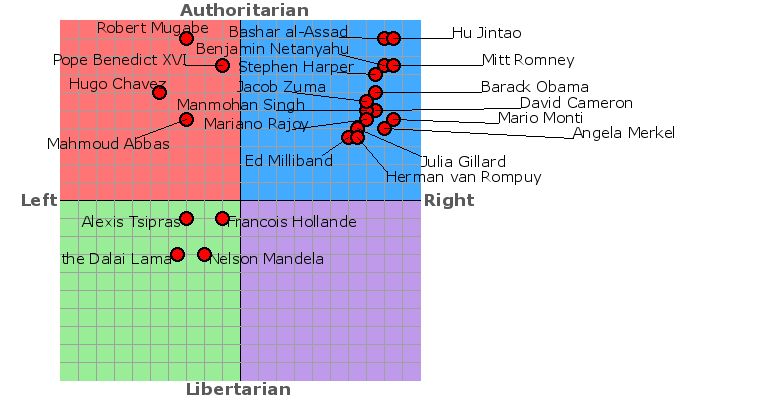I'm just glad he changed his name back from gookie.
Same here Cheesy Poofs
I'm just glad he changed his name back from gookie.
" though more conservative on race policies" "Very liberal on social issues"
am i the only one struggling to reconcile these...?
do people actually believe this lolstaunch conservatives said:
- The U.S. stands above all other countries in the world

- Most (56%) say Wall Street helps the economy more than it hurts -[
yesread this incorrectly initially, not sure what it means
A note on that: In the US, "liberal" is often used as a synonym for someone who throws their lot in with the Democratic Party, and "conservative" for one who throws their lot in with the Republican Party. Both terms have lost their meaning to some extent here, but "liberal" suffers from that a lot more. Obama is all about neoliberal (read: very pro-market) economics and an authoritarian security state; he's by no means a leftist. If you look at his policies, he's basically Nixon without the racism and homophobia.It's quite interesting to see that the "liberal" US president and the "Conservative" Canadian one are on the same plane.
Apparently, the site bases Pope Benedict's placement on the economic axis more on rhetoric than on practice; he talked a good game about giving to the poor and all that, but you didn't see him giving up the golden throne and whatnot. Much like a lot of the more well-off "liberals" in the US, if you think about it - "Sure, give the poor a helping hand, so long as it's not coming out of my pocket". Francis is better than Benedict in that regard, but he's still got a host of problems. I'm getting off track, though.I don't get the Pope being a leftist; how can he be, being leader of the Catholic Church? Maybe I'm missing something important here. The site's definition of left would be collectivism - which I see, after all, "we are all servants of the Lord and we will follow His work," while the totalitarian control I see due to the comparatively narrow guidelines set by Catholicism, but where does "social liberalism" come into play here? The "Libertarian" part, maybe? The disparity between popular opinion of "the left" and this source's are intriguing.
- (I'm surprised by the relatively low magnitude of this result, since I identify as an anarchist.)
ahh, i'd been wondering about that. does that come from anything in particular? shouldn't anarchy also place you on the farthest right at the bottom due to the idea of a government going entirely against the anarchist ideal of a classless society with no overseer to force wealth to equalize, while the "left" side is more about "sharing the wealth" in an increasingly more equal way, or am i missing something crucial here?No one is free till all are free. Will you keep living on your knees?
I completely agree with most of what you're saying, but I would like to point out that the flaws in Communism that you have identified only apply to coercive communism as opposed to voluntary communism. Coercive communism is where people have a communist society imposed upon them, but in a voluntary communist society (which could be constructed on a large scale given enough free land and a good way to ask people whether they wish to join a new communist society), these problems do not occur as everyone is working towards a common goal voluntarily, rather than being forced to. Voluntary communism has never really been tested on a large scale at all, only on a small scale (such as in monasteries, where monks run a micro society perfectly well), and personally, I think it would work extremely well if it was handled right.With no real method of force and no real "law" due to no organized government force with which to interpret and apply the law [nobody is above anyone else, after all, and therefore cannot order them to suffer a punishment such as jail time as this would imply that the judicial system has the right to decide the fate of another human being against their consent, yes?], who's to say that they could not simply be exploitative "under the radar" or even otherwise, if they can amass a force great enough for nobody to want to oppose the person in question or take their taxes?
Would be kinda interesting if everyone who took that test took it again, to see if there is a pattern to the shift in political position over the past two years. But that's not gonna happen.
